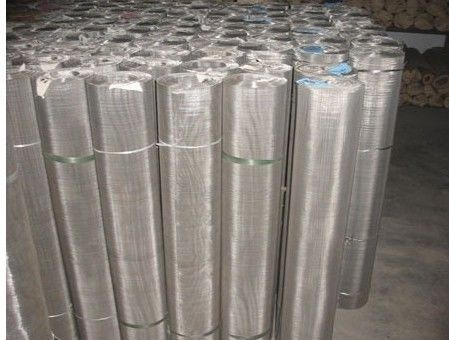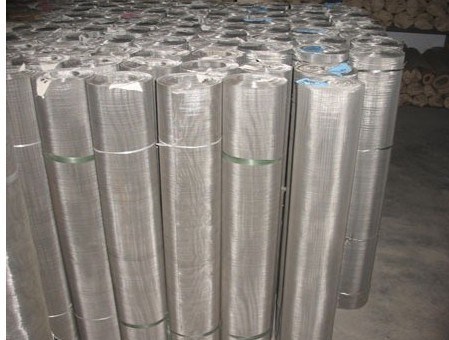316 Stainless Steel Wire Mesh/Screen
Product Details:
| Place of Origin: | China |
Payment & Shipping Terms:
| Minimum Order Quantity: | 5 square meters |
|---|---|
| Packaging Details: | Seal up, with plastic inside and wooden case or carton outside; |
| Delivery Time: | within 7- 20 days after receiving the advance payment. |
| Payment Terms: | L/C,T/T,Western Union, paypal |
|
Detail Information |
Product Description
316 Stainless Steel Wire Mesh/Screen Properties
The molybdenum gives 316 stainlesss steel wire mesh better overall corrosion resistant properties than Grade 304, particularly higher resistance to pitting and crevice corrosion in chloride environments. It has excellent forming and welding characteristics. It is readily brake or roll formed into a variety of parts for applications in the industrial, architectural, and transportation fields.
The molybdenum gives 316 stainlesss steel wire mesh better overall corrosion resistant properties than Grade 304, particularly higher resistance to pitting and crevice corrosion in chloride environments. It has excellent forming and welding characteristics. It is readily brake or roll formed into a variety of parts for applications in the industrial, architectural, and transportation fields.
Grade 316L stainless steel wire mesh, the low carbon version of 316 and is immune from sensitization (grain boundary carbide precipitation). Thus it is extensively used in heavy gauge welded components (over about 6mm). Grade 316H, with its higher carbon content has application at elevated temperatures, as does stabilized grade 316Ti.
The austenitic structure also gives these grades excellent toughness, even down to cryogenic temperatures
316 Stainless Steel Wire Mesh/Screen Corrosion Resistance
Excellent in a range of atmospheric environments and many corrosive media - generally more resistant than 304. Subject to pitting and crevice corrosion in warm chloride environments, and to stress corrosion cracking above about 60°C. Considered resistant to potable water with up to about 1000mg/L chlorides at ambient temperatures, reducing to about 500mg/L at 60°C.
316 is usually regarded as the standard "marine grade stainless steel", but it is not resistant to warm sea water. In many marine environments 316 does exhibit surface corrosion, usually visible as brown staining. This is particularly associated with crevices and rough surface finish.
316 Stainless Steel Wire Mesh/Screen Heat Resistance
Good oxidation resistance in intermittent service to 870°C and in continuous service to 925°C. Continuous use of 316 in the 425-860°C range is not recommended if subsequent aqueous corrosion resistance is important. Grade 316L is more resistant to carbide precipitation and can be used in the above temperature range. Grade 316H has higher strength at elevated temperatures and is sometimes used for structural and pressure-containing applications at temperatures above about 500°C.
Composition ranges for 316 stainless steels wire mesh/screen.
|
Grade
|
|
C
|
Mn
|
Si
|
P
|
S
|
Cr
|
Mo
|
Ni
|
N
|
|
316
|
Min
|
-
|
-
|
-
|
0
|
-
|
16.0
|
2.00
|
10.0
|
-
|
|
Max
|
0.08
|
2.0
|
0.75
|
0.045
|
0.03
|
18.0
|
3.00
|
14.0
|
0.10
|
|
|
316L
|
Min
|
-
|
-
|
-
|
-
|
-
|
16.0
|
2.00
|
10.0
|
-
|
|
Max
|
0.03
|
2.0
|
0.75
|
0.045
|
0.03
|
18.0
|
3.00
|
14.0
|
0.10
|
|
|
316H
|
Min
|
0.04
|
0.04
|
0
|
-
|
-
|
16.0
|
2.00
|
10.0
|
-
|
|
max
|
0.10
|
0.10
|
0.75
|
0.045
|
0.03
|
18.0
|
3.00
|
14.0
|
-
|
Mechanical properties at room temperature
|
|
SX316
|
SX316L
|
SX316Ti
|
|||
|
|
Typical
|
Minimum
|
Typical
|
Minimum
|
Typical
|
Minimum
|
|
Tensile Strength, MPa
|
580
|
515
|
570
|
485
|
600
|
515
|
|
Proof Stress (0.2 % offset), MPa
|
310
|
205
|
300
|
170
|
320
|
205
|
|
Elongation (Percent in L = 5.65 So)
|
55
|
40
|
60
|
40
|
50
|
40
|
|
Hardness (Brinell)
|
165
|
-
|
165
|
-
|
165
|
-
|
|
Erichsen Cup Test Value mm
|
8 - 10
|
-
|
10 - 11
|
-
|
-
|
-
|
|
Endurance (fatigue) limit, MPa
|
260
|
-
|
260
|
-
|
260
|
-
|
Possible alternative grades to 316 stainless steel Wire Mesh
|
Grade
|
Why it might be chosen instead of 316?
|
|
316Ti
|
Better resistance to temperatures of around 600-900°C is needed.
|
|
316N
|
Higher strength than standard 316.
|
|
317L
|
Higher resistance to chlorides than 316L, but with similar resistance to stress corrosion cracking.
|
|
904L
|
Much higher resistance to chlorides at elevated temperatures, with good formability
|
|
2205
|
Much higher resistance to chlorides at elevated temperatures, and higher strength than 316
|
Want to Know more details about this product




